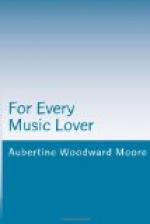Many a mother when advised to direct her child’s practicing, or at least to encourage it by her presence, has excused herself on the plea that it would bore her to listen. If the work bores the mother it is not surprising that the child attacks it with mind fixed on metal more attractive and eyes seeking the clock. Occupations which are repellent in early life leave behind them a memory calculated to render them forever distasteful. It is therefore a grave mistake not to make music study from the outset throb with vital interest. An appeal to the intellect will quicken the aesthetic instincts, be they never so slender, and almost any one will love work that engages all the faculties.
Those pupils are fortunate who come under the influence of a teacher with strong, well-balanced personality and ripe knowledge, and are treated as rational beings, capable of feeling, thinking and acting. Too many music teachers learn their business by experimenting on beginners. It has been suggested as a safeguard against their blunders, and all ignorance, carelessness and imposture, that music might be placed under the same legal protection accorded other important factors in social life, and that no one be permitted to teach it without a license granted by a competent board of judges after the applicant had passed a successful examination, theoretical and practical. This would be well if there was any certainty of choosing suitable persons to select the judges.
A practical Vienna musician, H. Geisler, has recently created no little sensation by asserting that the pianoforte, although indispensable for the advanced artist, is worthless, even harmful, in primary training, and that the methods used in teaching it are based on a total misapprehension of the musical development prescribed by nature. Sensual and intellectual perceptions must actively exist, he feels, before they can be expressed by means of an instrument. It is a mistake to presume that manual practice can call them into being, or to disregard the supremacy of the tone-sense. He considers the human voice the primitive educational instrument of music and believes the reasonable order of musical education to be: hearing, singing, performing.
This order is to be commended, and might readily be followed if primary instruction was given in classes, which being less expensive than private tuition, would admit of more frequent lessons and the services of a competent teacher. Classes afford the best opportunity for training the ear to accuracy in pitch, the eye to steadiness in reading notes, the mind to comprehension of key relationships, form and rhythmic movement, and the heart to a realization of the beauty and purport of music. In classes the stimulating effect of healthy competition may be felt, an impulse given to writing notes, transposing phrases and melodies, strengthening musical sentiment and refining the taste.




